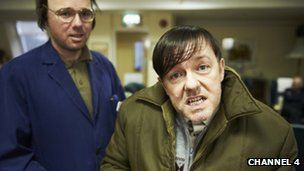Thursday 31 January 2013
(TV REVIEW) Derek: Episode 1
"He's good at playing a retard, isn't he?"
Ladies and gentlemen, my mother. Say what you like about the political incorrectness of the statement, but it was quite majestic in a sense how she was able to completely undermine the point of the programme in one fell comical swoop.
But perhaps that's a little harsh. If you remove the negative implications of the word 'retard', she had a valid point; Gervais portrayed the titular character excellently, in my opinion at least. Also, her comment was somewhat reflective of the public opinion, or at least the media's opinion of the show; that is, you are somewhat forced to dismiss any negative implications in order to gain guilt-free enjoyment from it, and vitally, to truly appreciate it. But the thing is, these 'negative implications' shouldn't really exist.
I shall clarify. Much of the supposed outrage at the show; no, all of the supposed outrage at the show has been squarely directed at the fact that, at a glance, it appears Gervais is mocking those with learning difficulties. Sadly, it seems that yet again people are confused by the subject of the joke and the target of the joke- something Gervais has had to put up with his whole career. Many fear the prospect of laughing at a programme featuring a man with some sort of mental health issue would result in getting their door kicked down by the thought police. Others think Gervais is just a bully, an opinion fuelled by that Susan Boyle business a few years ago. However, if you satisfy the following conditions of a) actually watching the programme and b) owning half a brain, you'll find this isn't really the case at all. Is Derek the butt of the joke? At times, yes, but this is literally a necessity of the sitcom genre. Regardless of the few directorial and scriptual misgivings (which I shall get onto later), it is crystal clear that Derek is intended to be a hero; a kind, simple man whom all of us should be more like. Gervais has said similar things about the character in various interviews, but it's something I've discovered for myself to be true. Derek is the sort of character who makes you want to reach into the screen and give them a hug; and if you don't, you hate all disabled people. Probably.
As you can see, trying to discuss the public 'controversy' and overall context of the show is a messy and circular affair. Then again, to ignore it would be similarly futile; aspects of Derek, both the programme and character, appear to be a response to some of the aforementioned criticism. But I don't think this is Ricky trying to tell everyone he was a good guy all along; I don't really think he cares. Yet to a degree the programme is undoubtedly a reaction to cynicism in general; both suggested and actual. To describe Derek in a sentence, it's a brave and engaging yet flawed comedy-drama that, on ocassion clumsily, treads the line between utter bleakness and life-affirming warmth.
So, now onto the actual programme. The first episode was a generally enjoyable experience; not quite living up to the quality of last year's pilot episode (which in my opinion got the comedy to drama ratio just right), but indicative that it's going to get progressively better throughout the 6-episode run. The laugh-ometer would probably give a reading of 'consistent chuckles and the ocassional laugh'- so perhaps not quite as much as I was expecting. But it is interesting to note that I was smiling throughout, in a way that meant I didn't really mind about the relative lack of laughter. The only major flaw would have to be the application of its drama and pathos; whereas The Office interweaved tragedy elegantly between all the dancing, knob gags and the quoting of Eric Hitchmo from the Coventry Conference ("I don't agree with that in the workplace!") like the sketchings of a fine pencil; Derek slaps on the woe by the paint can; think those massive abominations Neil Buchanan used to make on Art Attack. But is this such a bad thing? Apart from feeling a little patronised at times, especially when Karl Pilkington's otherwise fantastic character Dougie delivers a mawkish piece to camera, describing how everyone's such a 'big family' while that piano score plays incessently in the background. But these are not show-ruining gripes- my only suggestion for improvement would have been to direct more time and attention to the comedy so when the drama hits, it really hits. Not that my say has any effect on anything.
So what's my verdict? Well, I enjoyed it, and I'm sure, with an odd sense of certainity, that it just needs time to get going until it reaches its full potential, a gauntlet laid down in part by last year's fantastic pilot (specifically, the 'Joan' scenes) and also by the excellent 'making of' documentary which you can probably still catch on 4OD. After all, I watched the first episode of The Office with a relatively stony face; as the first episode of Derek made me laugh and smile, by that logic it's going to better it. Yet I'm highly doubtful it will, but not really through any fault of its own. Even if Derek isn't going to end up as good as either The Office or Extras, that should not spell disaster; I mean, it's already better than Life's Too Short, just by not being Life's Too Short. Besides, do I care if it's recognised as 'good' or not? Not too much. What is important is the connection one makes with it, which applies to any kind of art. Derek, in its slightly blundering way, made me feel a bit fuzzy inside. It also had Karl Pilkington in a silly wig.
Elliott
Subscribe to:
Post Comments (Atom)


No comments:
Post a Comment